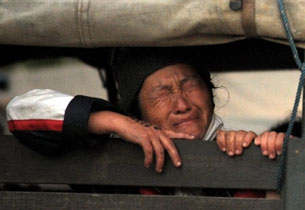Laos: Hmong resettlement still possible
| Publisher | Radio Free Asia |
| Publication Date | 14 January 2010 |
| Cite as | Radio Free Asia, Laos: Hmong resettlement still possible, 14 January 2010, available at: https://www.refworld.org/docid/4b59ad7a2b.html [accessed 1 June 2023] |
| Disclaimer | This is not a UNHCR publication. UNHCR is not responsible for, nor does it necessarily endorse, its content. Any views expressed are solely those of the author or publisher and do not necessarily reflect those of UNHCR, the United Nations or its Member States. |
2010-01-14
The Thai prime minister says Hmong repatriated to Laos could still be resettled to third countries.
 A refugee sits inside a truck during the operation to deport Hmong from a camp in Thailand's Petchabun province, Dec. 28, 2009. AFP
A refugee sits inside a truck during the operation to deport Hmong from a camp in Thailand's Petchabun province, Dec. 28, 2009. AFP
BANGKOK – More than 150 Lao Hmong asylum-seekers just repatriated from Thailand could still be resettled to third countries, according to the Thai prime minister.
"The people who went from Nong Khai – who perhaps would pose more concern – before we sent them back we allowed third countries to interview [them], and they continue to work with the Lao government now on resettlement in third countries," Prime Minister Abhisit Vejjajiva said.
Vejjajiva addressed a group of foreign journalists and community members on the security and safety of the Hmong on Thursday evening at the Intercontinental Hotel in Bangkok.
He said countries interested in receiving the Hmong for resettlement "can work it out with the Lao government," an arrangement the Thai government agreed to with Laos and the third countries before repatriating the group.
But Vejjajiva also indicated that Lao leaders are frustrated by the sudden international attention and lack of progress in resettlement talks.
"When I talked to the leaders in Laos, they said that if these countries were serious about working on resettlement they should have accepted these people long ago, and that a lot of them weren't able to go because they weren't issued visas."
When asked if the Lao government intended to allow the Hmong to resettle, Vejjajiva said he sees "no reason that they shouldn't [abide by this agreement]," adding that Bangkok is continuing to monitor the progress of talks between Laos and potential third-country candidates for resettlement.
"There is no gap of understanding between us and Laos, and I think we should put an end to this chapter," he said.
'Changed their minds'
Vejjajiva's statement contradicts claims made by Lao Foreign Ministry spokesman Khenthong Nuanthasing on Monday indicating that all 158 members of the group had "changed their minds" and agreed to settle in their homeland.
On Wednesday, spokeswoman for the United Nations High Commissioner for Refugees (UNHCR) Kitty Mackinsey said the agency has been unable to meet with the repatriated Hmong to determine if the claims by the Lao Foreign Ministry were true.
"We would like to get access to them to help facilitate their resettlement, because the resettlement countries still are offering them places to go.... The last time we talked to them they did want to go for resettlement," Mackinsey said.
The 158, all of whom have been designated "people of concern" by the UNHCR and could face persecution in Laos, were repatriated from Thailand on Dec. 28 along with a larger group from a camp in Petchabun totaling 4,711.
They had been held in a detention center overseen by immigration police in Nong Khai, Thailand.
Thai military units equipped with riot shields and batons entered a refugee camp at Huay Nam Khao in Petchabun and forced thousands of Hmong onto buses, sending them back across the Mekong River into Laos.
The forced repatriations ended years of uncertainty over the status of the Hmong.
Known as America's "forgotten allies," the Hmong sided with the United States during the Vietnam War and many fled Laos in 1975 when the communist Pathet Lao took power.
Tens of thousands have since been resettled in the United States.
Many Hmong say they fear persecution from the Lao government because of their Vietnam War-era ties with the United States.
Some Hmong fought under CIA advisers during a so-called "secret war" against communists in Laos.
Original reporting by Pimuk Rakkanam for RFA's Lao service. Lao service director: Viengsay Luangkhot. Written for the Web in English by Joshua Lipes. Edited by Sarah Jackson-Han.
Link to original story on RFA website
